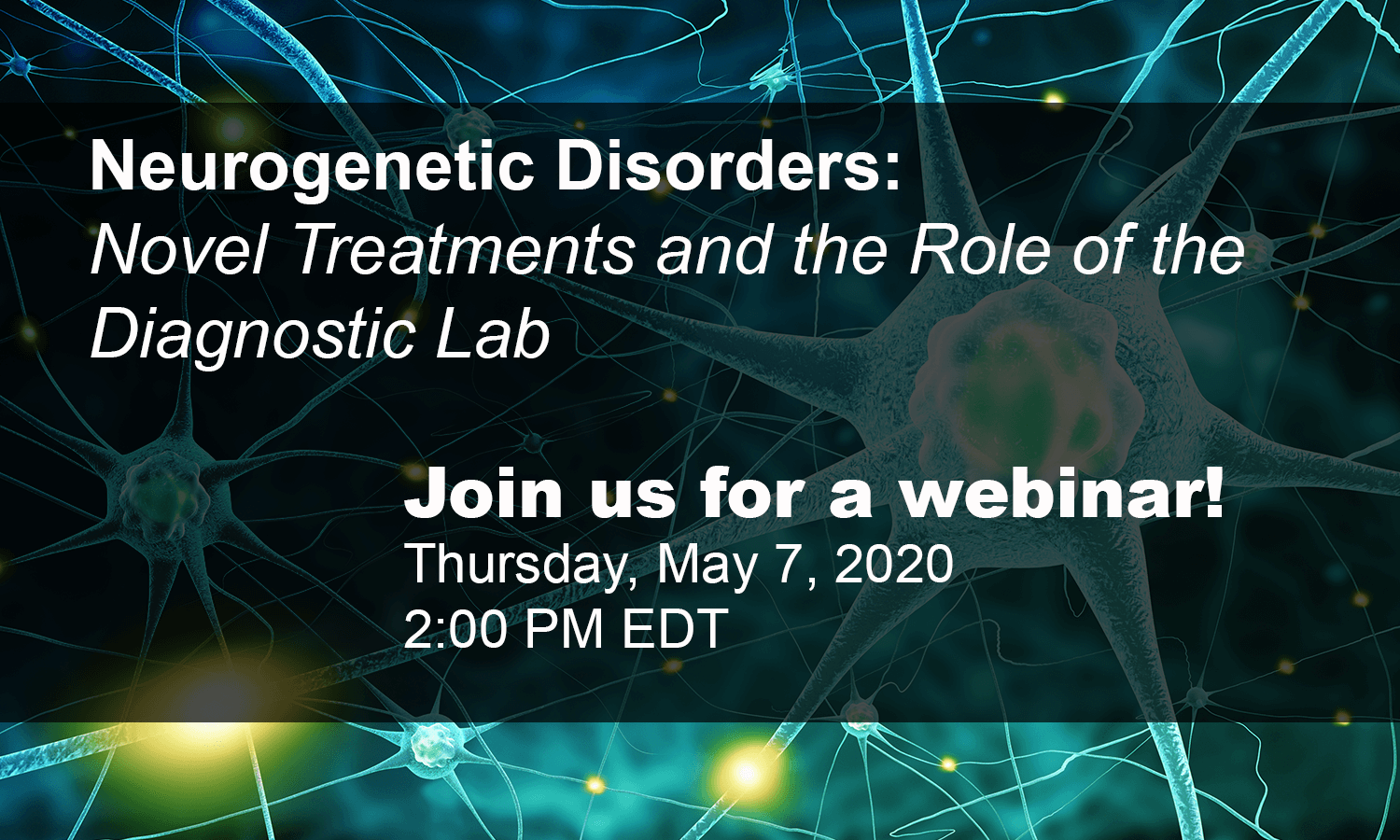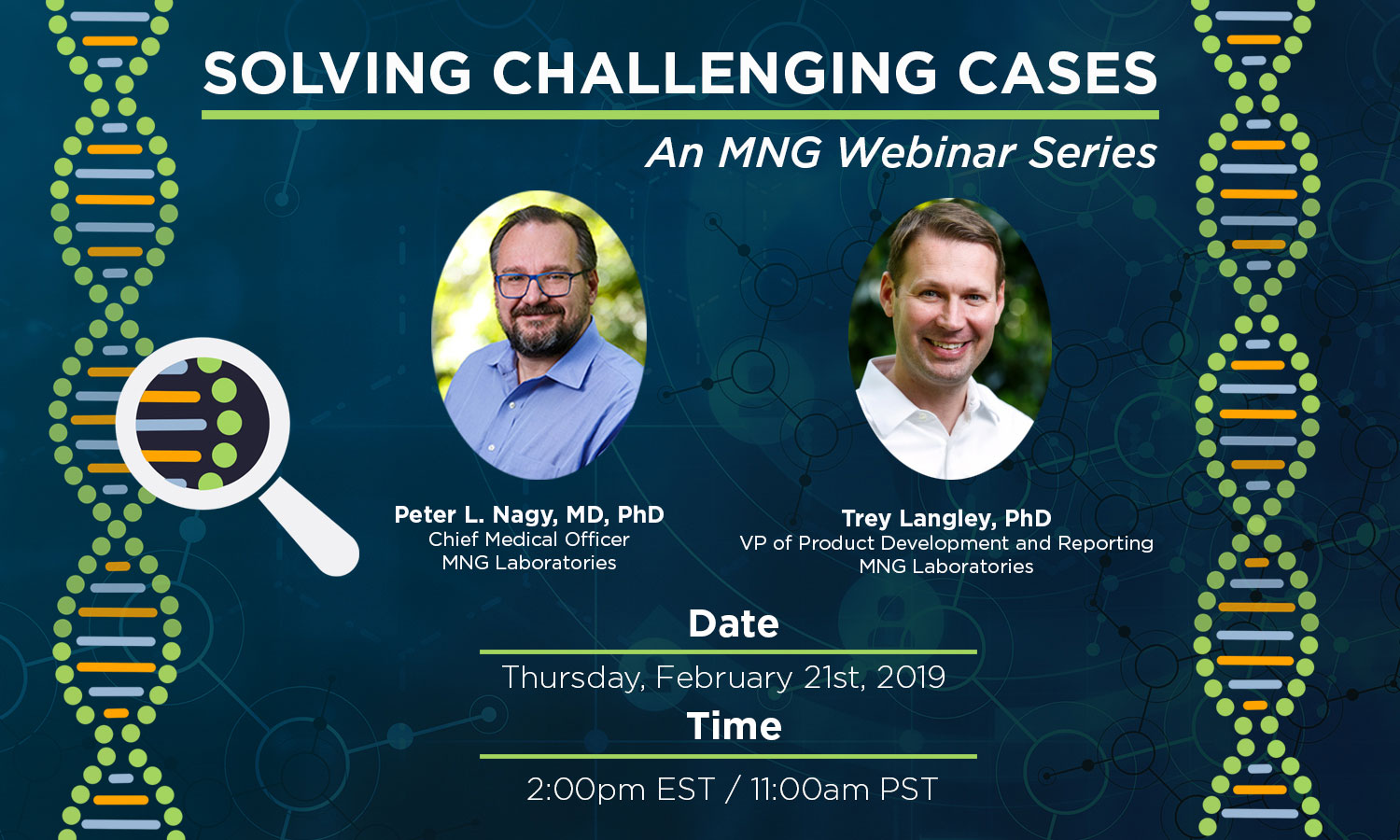MNG Laboratories Webinars

Neurogenetic Disorders: Novel Treatments and the Role of the Diagnostic Lab
Geraldine McDowell, PhD and Keith Hyland, PhD will discuss the importance of biochemical genetics testing and the consideration of inborn errors of metabolism in the differential diagnosis of neurological disease. MNG and LabCorp’s combined biochemical genetic test menu complements treatments that are currently available and in development, and the combined laboratory and drug development experience make LabCorp and MNG strong partners for clinicians.

Solving Challenging Cases: An MNG Webinar Series
As part of MNG Laboratories’ dedication to continued education, we are committing to a periodic Challenging Cases webinar series to complement our MNG Answers™ program. Each quarter we will present our most challenging cases and explain how advanced sequencing technologies improved the clinical sensitivity of the testing, and led to a diagnostic answer. MNG Laboratories’ Chief Medical Officer, Dr. Peter L. Nagy, and the Clinical Reporting Team led by Dr.

Improving The Clinical Sensitivity Of Genetic Testing
Join MNG Laboratories’ Chief Medical Officer, Dr. Peter L. Nagy, and the Clinical Reporting Team as they present multiple case studies illustrating the value of using complementary testing and data analysis methods to increase the clinical sensitivity of MNG’s genetic testing portfolio. The team will highlight cases solved through the application of high resolution CNV assessment, mitochondrial DNA analysis, transcriptome/RNA sequencing, and repeat expansion screening from genome sequencing datasets. After the presentation, there will be a 15 minute Q&A with our speakers.

Combining Genome Sequencing With Transcriptome Analysis Can Improve Diagnostic Outcomes
Join us for a webinar presented by our Chief Medical Officer, Dr. Peter L. Nagy, to discuss the benefits of performing and analyzing genome and RNA sequencing together. The increased number of single nucleotide and copy number variants associated with genome sequencing are best interpreted with the help of joint parental testing and the assessment of the functional significance of intronic and regulatory changes with a functional test like the transcriptome.

SPF Foundation & MNG Laboratories Joint Webinar
MNG Laboratories is joined the Spastic Paraplegia Foundation in a webinar to help educate patients on the testing options and genetic implications of Hereditary Spastic Paraplegia. Attendees will gain insights into HSP from a genetic and physiological perspective, how genetic testing works, and the best resources after a diagnosis.

Update On Neurotransmitter Disorders
Dr. Keith Hyland will provide an overview of Serotonin and Catecholamine metabolism, explain how disorders affecting these neurotransmitters are diagnosed within the laboratory and provide an update on the inherited diseases that affect this area of neuro-metabolism.
Use Of RNA Sequencing To Improve Diagnostic Sensitivity: What You Need To Know
Next-generation sequencing has evolved into a powerful tool helping thousands get molecular diagnosis of their conditions. In some cases, proving that a specific variant is the cause of a condition can be challenging or impossible based on information available in the literature. This is especially true for variants near intron-exon junctions. Similarly the splicing consequences of large intragenic deletions are also problematic to predict. Imprinting disorders where the parental origin of the variant is of importance requires additional data to assess appropriately.

Exome Use In Carrier Testing
In a review of our data, we found that over 40% of children born with catastrophic or severe disabilities that we diagnosed with rare autosomal recessive conditions carry pathogenic variants that would not have been detected using currently available targeted carrier tests. Join MNG Laboratories’ CMO, Dr. Peter L. Nagy, MD, PhD, as he discusses how the MNG Carrier Exome™ can detect rare potentially pathogenic variants that could possibly manifest in offspring which would otherwise not be detected by standard screening panels.

